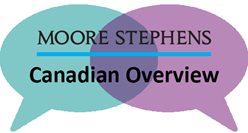 This article is from the quarterly Canadian Overview, a newsletter produced by the Canadian member firms of Moore Stephens North America. These articles are meant to pursue our mission ofbeing the best partner in your success by keeping you aware of the latest business news.
This article is from the quarterly Canadian Overview, a newsletter produced by the Canadian member firms of Moore Stephens North America. These articles are meant to pursue our mission ofbeing the best partner in your success by keeping you aware of the latest business news.
It appears that the Canadian Revenue Agency (CRA) has a new project: corporate car expenses. This change comes as a surprise as previous correspondence from CRA was proposing to disallow personal car expenses for owner managers.
In CRA correspondence that we have seen of late, the focus is on those companies that had an expense in the vehicle expense line of the tax return. The standard letter is asking for the following items:
- A detailed list of the general ledger transactions for vehicle expenses.
- Invoices of the ten largest items in one month in the year.
- A listing of the vehicles with clarification as to who owns the vehicles.
- The make and model of the vehicles that the company leased.
- The percentage allocation between personal use and business use as well as a copy of the log used to track the business and personal use.
- An explanation of how the business and personal use is dealt with. For example, they are asking if expenses were reduced or reimbursed or if there is an employee benefit or standby charge.
They appear to be dealing with the years 2016 and 2017, which will shortly be statue barred.
One of the main issues being dealt with by accountants is that many clients do not keep very good travel logs.
Additionally, there are clients who purchased cars in the owner’s name and not the corporation’s name, even though the corporation is deducting the expenses. Another issue is that the only backup for expenses are credit card statements and not the actual invoices or receipts. This could be a problem, as CRA has stated that they will not accept credit card statements because the statements do not provide sufficient detail. To date, we have not received correspondence from CRA that they will not accept the credit card statements, but we have reason to believe that this will be the case.
General Car Rules
In general, there are a set of rules depending on whether an individual or corporation owns the car. Where the company owns the car, there may be requirements for calculations on both the operating benefit and the standby charge. The operating benefit is a per kilometer benefit for every personal-use kilometer used ($0.28 per km). This amount should be included in the income of the individual who uses the corporate car. There is also the concept of a standby charge. If the car is corporate-owned, it is 2% of the original cost of the vehicle. If the car is corporate leased, it is 2/3 of the monthly lease cost. Both numbers are then multiplied by the number of months that the vehicle is available during the year. There is, however, a reduction of the standby charge where the car is used more than 50% business use and less than 20,000 km of personal use. In those cases, the standby charge is prorated based on the personal use versus the total use.
The challenge that many clients and taxpayers have is poor record keeping. One of the things to consider, in order to reduce the level of record keeping, is for the corporation to pay a “reasonable allowance”. Based on CRA rules, a reasonable allowance is a per kilometer allowance of $0.58 for the first 5,000 kilometers and $0.52 for each kilometer thereafter. The record keeping required is to submit the number of business kilometers driven each month. In this way, receipts and other backup are not required for the actual operating expenses.
When a reasonable allowance is paid, it does not show up on an individual’s T4 and the individual does not need to report it. The corporation deducts this expense as a car expense.
The key takeaway is to ensure that clients and taxpayers keep sufficient records to justify their business car expenses.
Contributed by
Howard Wasserman CPA, CA, CFP, TEP, from
Segal LLP. This piece was produced as a part of the quarterly Canadian Overview, a newsletter produced by the Canadian member firms of Moore Stephens North America.